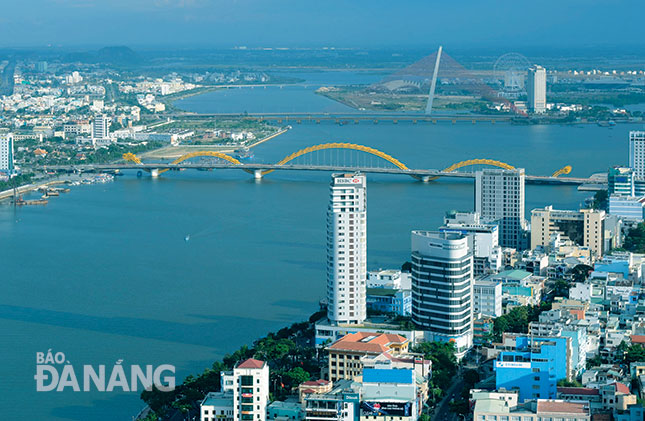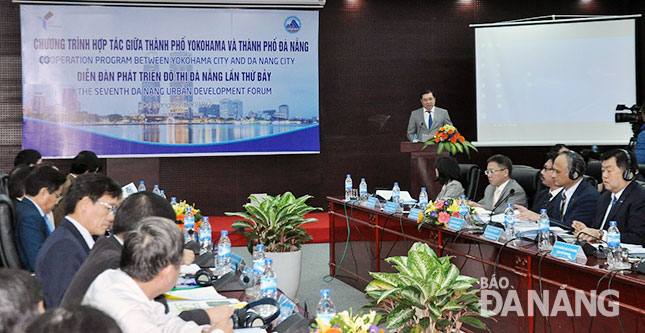Japanese experts offer ideas to develop city's urban areas
In the spotlight at the recent 7th Da Nang Urban Development Forum were discussions about energy-saving measures, the development of industrial parks, waste treatment, and plans for developing the Tho Quang fishing wharf in the years ahead.
 |
| A beautiful corner of Da Nang |
The forum was jointly organised by the municipal People’s Committee (PC), and the Yokohama City authorities.
In his opening address, municipal PC Chairman Huynh Duc Tho highly hailed Yokohama for enthusiastically assisting Da Nang in identifying its development orientations and implementing some local strategic projects since 2013.
The city leader also took the opportunity to appeal for more assistance from such international financial organisations as the World Bank, the Asian Development Bank, the Japan International Cooperation Agency (JICA), and the International Finance Corporation, plus the Japanese Embassy in Viet Nam, and businesses communities in both Da Nang and the Japanese city.
 |
| Chairman Tho addresing the event |
During a discussion session on energy-saving measures, representatives from the city’s Department of Construction said that the ‘Building Energy Efficiency Accelerator’ (BEA) project has been implemented effectively. BEA is part of the United Nations Sustainable Energy Program (SE4ALL) with 30 global partners committing to coordinate with cities worldwide to build energy efficiency.
In his ideas to implement a project for building Da Nang into an environmentally-friendly city, Mr Yasutoshi Sagami from Japan’s OSUMI Co Ltd underlined the importance of using energy audit.
An energy audit is an inspection, survey and analysis of energy flows, for energy conservation in a building, process or system to reduce the amount of energy input into the system without negatively affecting the output(s). In commercial and industrial real estate, an energy audit is the first step in identifying opportunities to reduce energy expense and carbon footprints.
As for practical plans to develop local IPs, in addition to appealing for more domestic and foreign investment into the existing IPs, the city is now focusing on developing new ones in a synchronous manner, and in line with the city’s sustainable development requirements.
Mr Takashi Nakata from the Hoa Cam IP-based Da Nang Foster Electric company pointed out to the fact that the Hoa Ninh IP is expected to be located far away from the city centre. Hence, bus services for the IP’s employees should be developed in the coming time to ease their travel experience.
Another expert from Yokohama City underlined the need for local IPs and the city’s Hi-tech Park to develop effective flood early warning, high security monitoring, traffic and environmental management and waste water treatment systems, as well as to ensure a closer connection with the city’s public transport systems.
According to the city’s Department of Natural Resources and the Environment, a total of between 900 and 930 tonnes of solid waste is collected from across the city every day. Meanwhile, the existing Khanh Son waste dump’s landfill areas are expected to be full by 2020, and its working life is likely to end no later than 2021.
Da Nang, in collaboration with Yokohama City and JICA, is currently implementing a waste classification project in the wards of Thach Thang and Thuan Phuoc in Hai Chau District on a trial basis. In 2018, the model will be expanded into the districts of Thanh Khe and Son Tra, and other wards in Hai Chau District.
Also next year, work will start on a local solid waste treatment complex project in Hoa Vang District with a daily capacity of between 1,000 and 1,500 tonnes.
With regard to the development of the Tho Quang fishing wharf, the city authorities are planning to develop this venue into a modern and highly competitive fisheries centre, with a focus on ensuring environment protection and food safety.
To realise this goal, experts from the Yokohama-based Y-PORT Center which provides smart urban solutions to cities in Asia, and the world as a whole, emphasised the significance of taking such synchronous solutions as enhancing the seafood production and processing quality, developing logistics services, and promoting environmental improvement.
Thanks to many similarities in geographical position, Yokohama is willing to instruct Da Nang’s fishermen how to use seafood freezing techniques to preserve their products’ peak freshness, as well as to utilise rapid filtration methods in wastewater treatment activities.